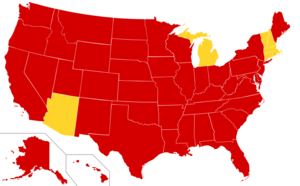- Republican Party (United States) presidential primaries, 2000
Infobox Election
election_name = Republican Presidential Primaries, 2000
country = United States
type = presidential
ongoing = no
previous_election = Republican Party (United States) presidential primaries, 1996
previous_year = 1996
next_election = Republican Party (United States) presidential primaries, 2004
next_year = 2004
election_date = 2000
nominee1 =George W. Bush
home_state1 =Texas
states_carried1 = 43+D.C.
popular_vote1 = 12,034,676
percentage1 = 62.00%
nominee2 =John McCain
home_state2 =Arizona
states_carried2 = 7
popular_vote2 = 6,061,332
percentage2 = 31.23%
nominee3 =Alan Keyes
home_state3 =Maryland
states_carried3 = 0
popular_vote3 = 985,819
percentage3 = 5.08%
map_size = 450px
map_caption = Republican Primary Results. Red denotes a Bush win, yellow denotes a McCain win
before_election =Bob Dole
before_party =
after_election =George W. Bush
after_party = The Republican Party primary began with a fairly wide field, as the Republicans lacked an incumbent President or Vice President.Texas GovernorGeorge W. Bush , son of the last Republican president, took an early lead with the support of much of the party establishment and a strong fund-raising effort. However,Arizona SenatorJohn McCain , considered adark horse , won 48% of the vote to Bush's 30% in theNew Hampshire primary, the first primary held, giving his campaign a great boost of energy, volunteers, and donations.The main primary season, then, came down to a race between Bush and McCain. McCain's campaign, centered on
campaign finance reform , drew the most press coverage and the greatest popular excitement. Many Republicans complained that Democrats and other non-Republicans enrolled in the party for the express purpose of voting for McCain, thus skewing the results.Fact|date=February 2007 Bush's campaign focused on "compassionate conservatism ", including a greater role for the federal government in funding education and large reductions in the income and capital gains tax rates.In the
South Carolina primary, McCain's momentum was halted by a strongly negative Bush campaign. Although the Bush campaign said it was not behind any attacks (more on this below), locals who supported Bush reportedly handed out fliers and made telephone calls to prospective voters suggesting among other things, that McCain was a "Manchurian candidate" and that he had fathered a child out of wedlock with a black New York-based prostitute (an incorrect reference to a child he and his wife had adopted from Bangladesh.) McCain won primaries inMichigan , his home state of Arizona, and a handful of Northeastern states, but faced difficulty in appealing to conservative Republican primary voters in spite of demonstrated support from Democrats and independents. Bush's victories in states like California and New York as well as conservative southern states gained him the nomination long before the Republican Convention.Allegations were made that
Karl Rove was responsible for a South Carolinapush poll that used racist innuendo intended to undermine support for McCain: "Would you be more likely or less likely to vote for John McCain for president if you knew he had fathered an illegitimate black child?" [ [http://www.boston.com/news/politics/president/articles/2004/03/21/the_anatomy_of_a_smear_campaign/ The anatomy of a smear campaign - The Boston Globe ] ] McCain campaign manager Richard Davis said he "had no idea who had made those calls, who paid for them, or how many were made," but in the 2004 film [http://www.imdb.com/title/tt0403910/ "Bush's Brain"] John Weaver, political director for McCain's 2000 campaign bid, stated "I believe I know where that decision was made; it was at the top of the Bush campaign." Rove has continually denied any such involvement.Other candidates included
social conservative activistGary Bauer , businessmanSteve Forbes ,Utah SenatorOrrin Hatch , formerAmbassador Alan Keyes , formerTennessee GovernorLamar Alexander , formerRed Cross director and cabinet memberElizabeth Dole ,Ohio CongressmanJohn Kasich , and former Vice PresidentDan Quayle . Bauer and Hatch campaigned on a traditional Republican platform of opposition to legalizedabortion and reductions in U.S. taxes. Keyes had a far more conservative platform, calling for the elimination of all federal taxes except tariffs. Keyes also called for a return to a ban on homosexuals in the military, while most GOP candidates supported the "don't ask, don't tell" policy. Keyes continued to participate in the campaign for nearly all the primaries and continued to appear in the debates with frontrunners McCain and Bush. As in 1996, Forbes campaigned on making the federal income tax non-graduated, an idea he called theflat tax , although he increased his focus on social conservatives in 2000. Although Forbes came a close second to Bush in theIowa caucuses, none of these other candidates won a primary.* Republican Party candidates
Republican primary results by State
Popular vote result
Popular vote result [ [http://www.ourcampaigns.com/RaceDetail.html?RaceID=55218 Our Campaigns - US President - R Primaries Race - Feb 01, 2000 ] ] :
*George W. Bush - 12,034,676 (62.00%)
*John McCain - 6,061,332 (31.23%)
*Alan Keyes - 985,819 (5.08%)
*Steve Forbes - 171,860 (0.89%)
* Unpledged delegates - 61,246 (0.32%)
*Gary Bauer - 60,709 (0.31%)
*Orrin Hatch - 15,958 (0.08%)References
Wikimedia Foundation. 2010.

